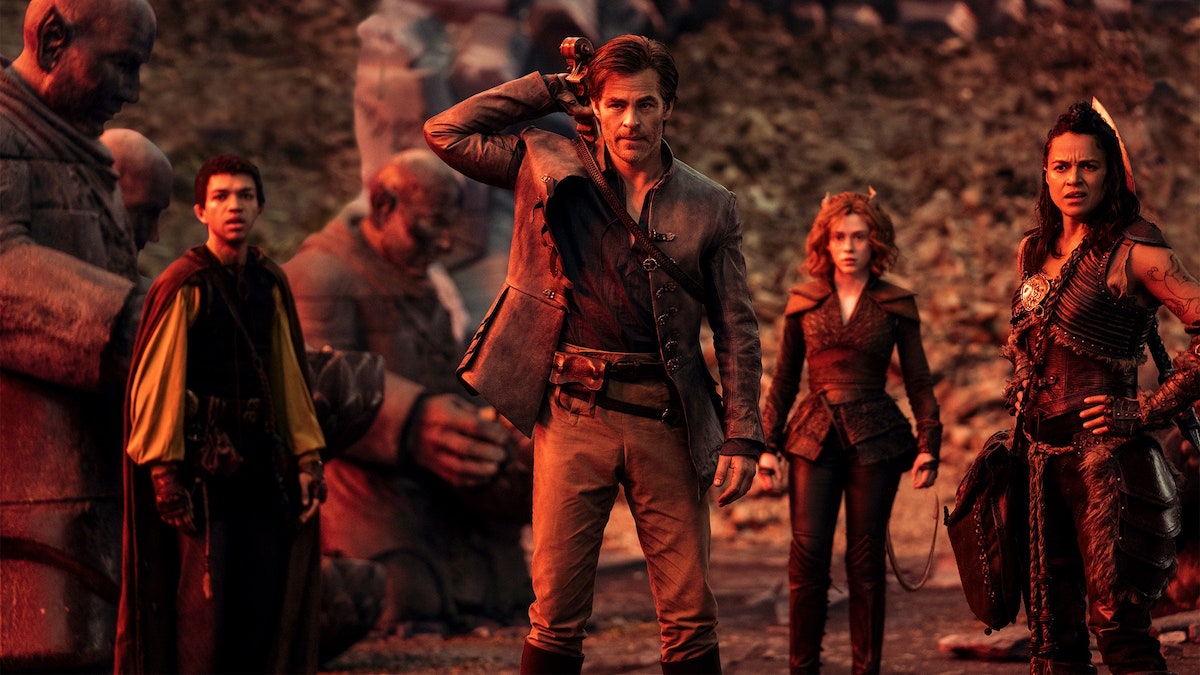The most popular entertainment for boys not yet overtaken by the miserable ideology of our times is the tabletop game Dungeons & Dragons, a source of friendship and adventure. It became a part of pop culture with Stranger Things recently but turned out to be of little importance to that show. Now there’s a new attempt to turn the game to blockbuster profit with the movie Dungeons & Dragons: Honor Among Thieves.
Despite a name that broadcasts its pointlessness, the movie is a success, perhaps because of its sophomoric humor. It’s coming after an absence of such comedies in theaters, as well as movies for kids. It can even become a franchise. Unfortunately, it’s one of these stories where every male character is reprehensible or pathetic, an object of mockery, and the females are amazing, for good and evil both. (Except, of course, for one non-white male character, who is above reproach, to signal to an otherwise easily offended audience that the protagonists are morally acceptable.)
Speaking of protagonists, our leading man is Chris Pine, one of the many Chrises who flourished in Hollywood a dozen years back or so who have failed to attract the attention of a talented director and cannot hope to do anything but Marvel or Star Trek movies. He plays a bard with a story of a dead wife and lost daughter with whom he wishes to be reunited. Said daughter is in the hands of a former fellow thief, now self-promoted to ruler and antagonist. The bard, to save her, assembles a party and sets on a quest.
As for the party, the bard who leads them and whom they help is mocked by everyone and indulges in self-mockery himself and takes the blame for almost everything. His emasculation is signaled by, among other things, the fact that his knits mittens. Mittens. As you probably have guessed, women do the fighting for him, starting with his barbarian friend, played by Michelle Rodriguez of the seemingly eternal Fast and Furious series. She also saved him from being a drunk after his wife’s death and raised his daughter. Presumably, he’s the protagonist because he seeks redemption; yet he cannot be redeemed, since he is incapable of atonement or feeling guilt. All this is waved aside with silly jokes.
As for the barbarian lady, she was thrown out of her tribe for falling in love with a gnomish figure played by the formerly very handsome Bradley Cooper. She turned out to be too much barbarian for that soft creature, so he found himself another giant lover instead, who treats him like a child or a pet. Perhaps this is the fate of modern man: Only the female of the species can be manly. Even the antagonist, played by Hugh Grant, who, like most actors who make a comeback, is now happily busy caricaturing his former self as a sniveling, foppish Brit, a weakling dominated and masterminded, you guessed it, by a powerful magical woman.
The bard and barbarian are middle-aged, but their two companions are teenagers. One, Simon the Sorcerer (Justice Smith), is a sorcerer who lacks self-esteem. He, of course, has to learn to be confident, whereupon he suddenly becomes powerful. Maybe the only well-written line in the movie is his self-characterization. In trying to remind a girl of his existence, he recalls how she had previously dismissed him when he tried to court her: She told him he makes her sad, not for anything he does, but for who he is. This sad sack adds to being effete an English accent and that’s about it. This is not the kind of movie where acting is attempted.
That girl (Sophia Lillis) is the fourth and last member of the party, a druid with shape-shifting powers. She is the film’s social justice warrior, a victim of discrimination and a defender of the downtrodden and outcast, and the female who does most to point out to the males how worthless they are. She expresses the pieties of a story where the rich are all murdered (by the antagonist, so it’s OK) and the protagonists redistribute all their money to the poor by way of saving their lives.
Latter-day liberalism thus destroys yet another hope that boys, especially, entertain of finding something else than the ideologies and pathologies that drive them to despair—high fantasy, with its medieval setting, love of honor, and a testing of virtues. On the other hand, the movie is such a caricature that it inadvertently reveals that the only liberal story that exists—the egalitarian revolution with its attendant therapy—can work only as a fantasy, if at the price of destroying fantasy.
Conservatives are not busy making art or paying for art to be made, but we must at least criticize it—understand it, choose to reject the miserable stuff, and look instead to the better offerings—in an effort to protect the public taste from further degeneration. If every story turns into the revenge of clever, tough females on hapless, guilty males on the way to the revolution, storytelling becomes desiccated even as it becomes boring, and those moved by love of the beautiful will be terribly corrupted. The protagonists are an image of the all-American family, mom and dad, boy and girl, but one that spends more time heaping contempt on the males than even heaping praise on the females.
So let’s expose the nonsense wherever it seems to gain popularity or prestige; it’s a matter of dignity not to allow our boys to be brought up with such humiliations. It’s madness to teach kids the liberalism of “we have nothing to fear but fear itself,” as well as to endlessly rehearse stories of parents who apologize to children who blame and despise them. Turning storytelling into therapy is also madness, as is using advertising of brands to try to brainwash kids. We should stand against it or this corruption of the vision of the traditional family will triumph, at least in public.

